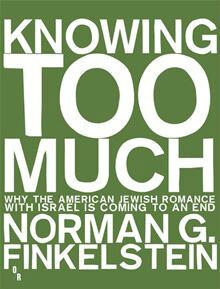The Electronic Intifada London 11 July 2012

There is no doubt that Norman Finkelstein has suffered for his criticism of Israel. Although once feared as Israel’s harshest academic critic in the West, lately he seems to spend much of his time denouncing the Palestine solidarity movement.
He has furiously denounced the Palestinian-led campaign for boycott, divestment and sanctions against Israel as “a cult” (projection bias, perhaps, as his own following becomes increasingly cult-like). He dismisses as unrealistic any approach to resolving “the conflict” other than a two-state one. Yet in the appendix to Knowing Too Much, his latest book, he claims that Israel’s wall in the West Bank, once completed, will “preempt any possibility of a two-state settlement, condemning Palestine and Israel to endless bloodshed” (308).
In Finkelstein’s blinkered view, then, there are only two options. Either the “conflict” is “settled” via partition between an Israeli state and a rump Palestinian state on 22 percent of the former land of Palestine, or there will be “endless bloodshed.” At best, you could call this an extreme lack of imagination.
His latest book does not focus on the issue of “what is to be done.” It seems he’s saving that for “a forthcoming book on resolving the Israel-Palestine conflict” (438, note 1). Instead, Knowing Too Much demonstrates Finkelstein’s great strength: picking apart and demolishing the arguments of his pro-Israel enemies.
The book’s thesis is explained by the subtitle Why the American Jewish Romance With Israel is Coming to An End. Finkelstein summons polling and other evidence to back up his point that liberal American Zionists, Israel’s firmest supporters since 1967, have started to become more and more embarrassed by the state as it shifts more and more to the right, and its many crimes become more obvious to the world.
Casting Israel adrift
“American Jewry will increasingly have to decide between two mutually exclusive options,” he concludes. “The first is to jettison its professed liberal values … [but] the more likely scenario is that American Jews will cast Israel adrift” (302).
Finkelstein’s argument on this point is essentially complete by page 89. But he then spends the remainder (449 pages in total) taking apart various “popular bestsellers” that continue to propagate various liberal Zionist myths. He explains his approach: “Up until recent times … most scholarship on the Israel-Palestine conflict could be described with only slight exaggeration as Exodus with footnotes” (93). Exodus is Leon Uris’s 1958 Zionist propaganda novel that was a bestseller at the time and later made into a Hollywood film starring Paul Newman.
Finkelstein thus targets books in the spirit of Exodus, since although scholarship has improved, some popular literature is still heavily skewed towards the Zionist narrative.
These chapters, the bulk of Knowing Too Much, are a mixed bag. Finkelstein ably demolishes his targets, but it sometimes feels like shooting fish in a barrel. I had never heard of Foxbats Over Dimona — a 2007 book that had little impact — and it sounds utterly ridiculous, but the chapter dedicated to it seems tangential.
More to the point is his evisceration of former Israeli prisoner guard Jeffery Goldberg’s self-justifying memoir (“He claims that he ‘never hit a Palestinian who wasn’t already hitting me,’” 120). Goldberg — who has no discernible expertise — has emerged as an influential figure on Palestinian-Israeli affairs, courted and flattered even by Barack Obama. Also quite good is how Finkelstein undermines the Israeli ambassador to the US Michael Oren’s bestselling account of the Israeli-Palestinian negotiations at Camp David.
A good kicking for Benny Morris
The best chapter in the book is the one dedicated to giving Benny Morris a good kicking. Morris gained fame as one of the “new historians” who dived into the Israeli archives and reassessed old Zionist myths about the establishment of Israel. Morris’ exposure of the deliberate and calculated nature of Israel’s mass expulsion of Palestinians in 1948 remains significant.
But Morris himself has moved more and more to the right over the years, giving an infamous interview with Israeli daily Haaretz in 2004 in which he openly said: “There are circumstances in history that justify ethnic cleansing … A Jewish state would not have come into being without the uprooting of 700,000 Palestinians” (“Survival of the Fittest,” 9 January 2004).
By contrasting “old Morris” with “new Morris,” Finkelstein shows how the historian has revolved 180 degrees in some cases. Although “old Morris” was not without his problems, as a historian he was at least honest enough to reveal many facts.
Finkelstein lands so many great zingers and devastating judgments here that it is actually fun to read as well as competent. Morris’s last book, Finkelstein writes, “lacks any redeeming value and reeks of rancid propaganda” (254); “the new Morris has discarded his prodigious scholarly apparatus … and instead cribbed a vacuous formula and hitched it to an ahistorical framework … for which he adduces not a scrap of evidence … which possesses the singular virtue of exonerating Zionism” (265); “the new Morris inters the whole of the historical record that the old Morris so painstakingly exhumed” (280); and, “He appears to have culled grand insights from The Complete Idiot’s Guide to Orientalist Stereotypes” (293).
Unconvincing
If Knowing Too Much had come out in 2008 (as originally intended), the central argument may have been more controversial, but as Finkelstein notes it has by now almost passed into conventional wisdom (299). A more interesting question, though, is why this shift in liberal opinion has happened, and here Finkelstein is most unconvincing.
It seems he puts it down to factors such as “critical publications by .. B’Tselem, Human Rights Watch and Amnesty International … Haaretz reporters Gideon Levy and Amira Hass;” and the fact that “mainstream historical scholarship” now “upholds impressive standards of objectivity” (xvii). You may have noticed a critical omission: any Palestinian agency whatsoever.
Palestinian resistance, activism and educational campaigns such as boycott, divestment and sanctions are ignored in this book, despite the significant and growing influence they have had especially over the last few years. Even the Palestinian human rights group Al-Haq is marginalized in Finkelstein’s account: it has a single listing in the index compared to over a dozen for the Israeli human rights group B’Tselem (despite the fact that Al-Haq was established a decade before B’Tselem and has a solid international reputation).
Finkelstein would probably argue this omission is down to his focus on “mainstream” or “liberal” opinion. But on the evidence of this book, these remain fairly vague terms. Even if unintentional, this approach is no excuse for marginalizing Palestinians from their own struggle.
Asa Winstanley is an investigative journalist from London who has lived and reported from occupied Palestine. His website is www.winstanleys.org.





Comments
The reviewer writes of
Permalink Jonathan replied on
The reviewer writes of Finkelstein: "lately he seems to spend much of his time denouncing the Palestine solidarity movement." What does Finkelstein's critique of BDS have to do with his new book? Is that what his book is about? Although the author gives a mixed review, it clear from the beginning, he has a bone to pick with Finkelstein. And, that is it personal.
I found the book highly readable and impeccably researched. I use it as a constant resource and would highly recommend it to anyone interested in the topic. And by the way, as for Al-Haq, I had never heard of it, until I started reading Finkelstein.
Nailed it
Permalink Chris Whitman replied on
Nailed it
Answers
Permalink eGuard replied on
"What does Finkelstein's critique of BDS have to do with his new book?" - Read the title of this review. Then, check the review for the common factor (hint: it starts with the letters "Norman"). Third job, and a nice reading puzzle: check the timeline references Asa Winstanley uses for the answer.
"... it [is] clear from the beginning, he has a bone to pick with Finkelstein. And, that [it is] personal". No that is not clear at all. Please show it, quote it, point to it.
I read "Knowing too Much" and
Permalink Jonathan replied on
I read "Knowing too Much" and did not coming away feeling that Finkelstein: "airbrushes Palestinians out of their own struggle". In fact, for anyone arguing the topic with Israeli apologists, this book is an excellent resource, for learning the facts of the Palestinian struggle. Finkelstein has broken it down, time and time again for those of us interested in debunking Exodus with footnotes. When I read this review, a few points stood out. Firstly the author states what I already alluded to as being a personal attack, "lately he seems to spend much of his time denouncing the Palestine solidarity movement." Is that really relevant to a book review that is in no way about BDS? As the reviewer states towards the end. Does he really know what Finkelstein does with his time? Winstanley sounds very childish at this point. Is Finkelstein not allowed to critique a faction of the Palestinian movement? Must we be so politically correct? Secondly, at one point the author says: "In Finkelstein’s blinkered view'"..I found that to be in the realm of a personal attack. You may disagree.
Easily distracted, are you?
Permalink eGuard replied on
I just answered the questions you wrote yourself. And nobody asked for *your* review. Especially since you cannot keep things apart.
for anyone arguing the topic
Permalink Asa Winstanley replied on
I agree with that, as I think my review makes clear.
I disagree with that, for the reasons I stated in the review. The book is not about the Palestinians themselves so much as Israel’s defenders in the West. That is fine, and very useful in places. My problem is the parts (a minority of the book to be sure) that suggest that progress which has been made in educating people in the West about the plight of the Palestinians is all purely down to: liberal Israeli journalists, B’Tselem etc. In fact Palestinians themselves have made great acheivements in this area, including through BDS. BDS educates: somthing FInkelstein seems to miss. He need not write about BDS (I’m glad he didn’t considering his hostile attitude to the movement), but he could have at least given Palestinians a little credit for their own acheivements.
NF says the only options are either two-states or “endless bloodshed”. I call it blinkered, narrow minded: whatever. It’s pretty unimaginative and dogmatic if you ask me.
Hi Asa. Thanks for writing!
Permalink Jonathan replied on
Hi Asa. Thanks for writing!
Thanks for this review
Permalink JIM replied on
I had respected Finklestein until his opposition to BDS. He still offers some good commentary on the issue of Palestine but referring to BDS as a "cult" was slander. Thanks to Electronic Intifada, Mondoweiss and Asa, Americans are much more informed about the violent takeover of Palestinian land by Israel. Americans are beginning to wake up thanks to you good people! Keep up the good work. End the Jim Crow settlements! Don't despair! -- Jim, Honolulu Hawai'i
Winstanley Book Review of Finkelstein, Knowing Too Much
Permalink Yonah Zvi replied on
I attended two lectures by Finkelstein last year in London. Finkelstein's rather stinging "cult" epithet criticised those whose desire is to belong to a club of true believers even more than to achieve a result. In fact, Finkelstein discussed BDS sympathetically. The disagreement between him and some BDS activists concerned not the activity but the demands of the campaign. Finkelstein thought they should centre on withdrawal of Israel behind the green line, and support for a Palestinian state in the remainder of Palestine, as agreed by most people and respected institutions internationally. He criticised the additional demand for a right of return of Palestinians to Israel, not on merit, but for being unlikely to be achievable, due to lack of broad international support. One can see the point of either of these positions on tactics. Winstanley distorts Finkelstein's position in order to reduce his influence on the debate. As a regular reader of Winstanley's informative reports, which I have valued, I am disappointed that I must now consider them with a degree of mistrust that I did not feel before. That is the price that honesty exacts from cheap polemic. A sad day.
Spend any amount of time
Permalink Asa Winstanley replied on
Spend any amount of time talking to Palestinian activist groups, civil society groups, NGOs or political factions and one soon learns that one of the few things they almost unanimously agree on is the Right of Return. If Finkelstein claims it’s unobtainable I couldn’t really care less, it’s not his struggle.
Oh, you do care what
Permalink Yonah Zvi replied on
Oh, you do care what Finkelstein thinks, otherwise you wouldn't distort his position so as to discredit him. But why should we not debate the fact that there is worldwide support for a 2 state solution based on the green line border, but far less support for a right of return. By the way, I support a right of return, with financial compensation for those who prefer not to return. However, the Palestinians face a similar dilemma as that faced by the Republican IRA a few years ago. The IRA had fought the British to a stalemate but not a victory. The Adams-McGuiness majority decided to consolidate the civil rights and powersharing that was within the foreseeable grasp of the Irish nationalists, rather than sacrifice these indefinitely against the prospect of "final" victory. The Continuity IRA took a different view. History will judge that decision. It was for the Irish to make -- but there was no unanimous "Irish" opinion (how could there be?). The issue Finkelstein raises is a legitimate one, and I am sure that Palestinians debate it too, because they are the ones who are suffering, and they are forced to weigh the gains they wish to preserve against the gains they may never make. That is the difficulty of real struggle on the ground. What we do here "till final internet victory" is a luxury reserved for sympathisers who face no real risks.
Oh, you do care what
Permalink Yonah Zvi replied on
Oh, you do care what Finkelstein thinks, otherwise you wouldn't distort his position so as to discredit him. But why should we not debate the fact that there is worldwide support for a 2 state solution based on the green line border, but far less support for a right of return. By the way, I support a right of return, with financial compensation for those who prefer not to return. However, the Palestinians face a similar dilemma as that faced by the Republican IRA a few years ago. The IRA had fought the British to a stalemate but not a victory. The Adams-McGuiness majority decided to consolidate the civil rights and powersharing that was within the foreseeable grasp of the Irish nationalists, rather than sacrifice these indefinitely against the prospect of "final" victory. The Continuity IRA took a different view. History will judge that decision. It was for the Irish to make -- but there was no unanimous "Irish" opinion (how could there be?). The issue Finkelstein raises is a legitimate one, and I am sure that Palestinians debate it too, because they are the ones who are suffering, and they are forced to weigh the gains they wish to preserve against the gains they may never make. That is the difficulty of real struggle on the ground. What we do here "till final internet victory" is a luxury reserved for sympathisers who face no real risks.
Target audience
Permalink Yochanan replied on
Finkelstein's book focuses on why the American JEWISH love affair with Israel is coming to an end, which is why Asa's last section makes no sense. American Jews tend to read elite liberal newpapers and international publications, but not Palestinian sources (by and large). They read Ha'aretz, not EI, and hear about reports from B'Tselem, not Al-Haq. Were Finkelstein addressing global public opinion towards Israel, which long ago began to sour, Asa would have a point. Given that the rest of the review is (begrudgingly) positive, it seems odd to latch on to this poorly thought out last comment as the review's title.
Read what I wrote again: I
Permalink Asa Winstanley replied on
Read what I wrote again: I mention the “shift in liberal opinion”, since that is what the section quoted (xvii) is about: liberal opinion in general, not liberal Jewish opinion in particular.